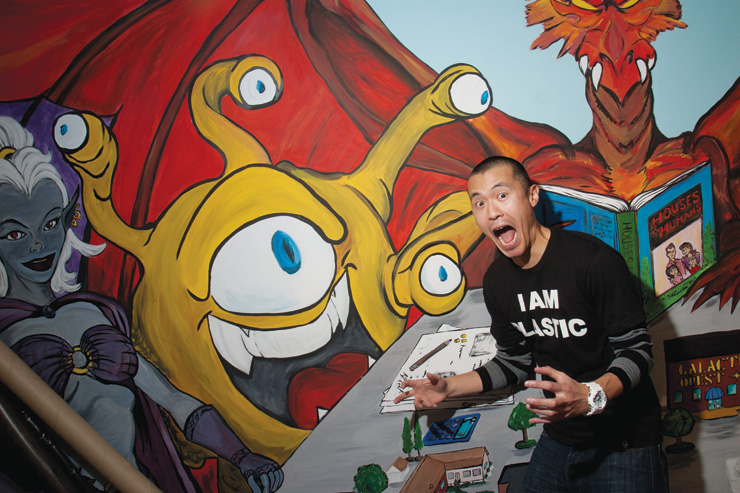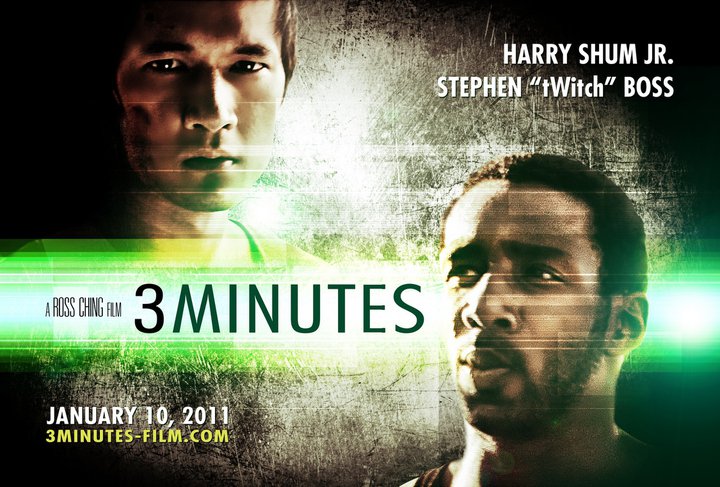Eugene Ahn, known as Adam WarRock, left the law to do this weird-cool-nerd-music thing. The rap artist now has a growing online following, which includes fellow hipster nerd Ira Glass.
by Lola Pak
photograph by Matthew M. Wong
Eugene Ahn seems cool enough. Sporting a G-shock watch and a black T-shirt emblazoned with “I Am Plastic,” the tall, lanky Memphis native raps with a smooth, deep, made-for-talk radio voice. In fact, his pipes have already been tapped in a podcast series—which already sounds so much cooler than just mouthing on the radio.
During a recent performance at a small venue in an Atlanta, Ga., suburb, Ahn, who goes by the stage name Adam WarRock, shares his personal backstory between songs—about how he quit his day job as a litigation attorney to pursue music full time.
Then you listen closely to what he’s rapping about: The Hulk? Ira Glass? Gotham City? And you realize, for all his cool, this guy is also a total geek.
If you’re a comic book fan, the title of Ahn’s first album, The War For Infinity, and his stage name may ring a bell; they reference the cosmic Marvel hero Adam Warlock and 1991 comic saga “The Infinity Gauntlet.” For the rest of us, just know this: He raps about comic books, among other unconventional hip-hop topics, really, really confidently.
Ahn is what you would call a nerdcore hip-hop artist, though in typical geek chic fashion, he prefers not to be labeled so strictly by a still-emerging musical genre. Less than a decade old, nerdcore hip-hop can be defined loosely as music for geeks. Themes and subject matter include everything from computer coding to hacking to sci-fi, you know, stuff those guys would like, but the artists—ranging from computer programmers to librarians—rap to the beats and bass of gangsta-style hip-hop versus Mozart.
The earliest known reference to nerdcore was made at the dawn of the new millennium by Damian Hess, also known as MC Frontalot, widely considered to be the father of nerdcore. He once told the BBC that nerdcore is like every other sort of hip-hop, but considerably “less cool.”
Ahn believes the genre is often mistakenly portrayed as “a bunch of white guys who hate rap,” and so they make it the “way that they want to.” For him, though, nerdcore has always been more defined by the artists’ personal interests and influences than a conscious effort to fit into a single musical style, which is why the lyrics are usually the only way to tell if a song is nerdcore or not.
Hip-hop lent itself particularly well to the messages that Ahn wanted to relay in his music. As a spoken-word enthusiast at Ohio State University and a perennial news follower, he began mashing rap and politics to create songs that connected hot-button topics like the war in Afghanistan to comic book characters such as Harvey Dent, the district-attorney-turned-supervillain of DC Comics’ Gotham City.
“If nerds are supposed to be smarter than everyone else, you have to be political to a certain degree because we live in a time where all of this stuff is really important,” says Ahn. “It becomes really dire to say something.”
One listen to his song “My Tea Party” clearly demonstrates the 30-year-old’s unabashed views as a liberal Democrat. It starts with an audio clip of SNL’s Tina Fey doing her now-famous impersonation of Sarah Palin, then leads into lyrics that declare:
If this a tea party, hold your cup / Sip in polite fashion and hold your pinky finger up / Hope you don’t mind, I’mma pull my seat up / ‘Cause I want my country back too, you ignorant f**ks.
Political engagement has long been important to Ahn, who got involved with Get Out the Vote drives during 2006 and 2008. “I kind of went overboard with it, probably,” he says. Going overboard is a consistent theme with this second generation Korean American, who freely admits to being a huge nerd. “I think there is a bit of compulsion when I get into something to want to know everything about it,” he muses, citing X-Men and HBO series The Wire as some of his other addictions. “Regular people have hobbies that they do in their free time, and it’s fun. For nerds and geeks, they have obsessions where, if you didn’t do it, you would be miserable.”
This explains why Ahn gave up his lucrative law career last April to pursue his personal obsession. “I was too exhausted to do [music] at night on the side [plus] the day job,” he says. “I thought long and hard about it, and probably that day my boss yelled at me. It was just the realization that I couldn’t do everything anymore.”
The choice became clearer when he began taking naps under his desk during lunch breaks and mid-day dentist appointments started feeling like vacation. “I was like, wow… I really hate my job,” says Ahn, who sports thick-framed glasses and a buzz haircut.
Because he had already been moonlighting as a rapper, a small but sturdy safety net was in place as he made the transition to full-time emcee. His first stop? The web. Ahn drew on his background as a podcast host for War Rocket Ajax, a talk-show featuring mostly interviews and discussions with comic book artists, and also tapped his personal network of internet-obsessed friends to build an online following. Among his more well known fans is Ira Glass, host of popular radio program This American Life, distributed by Public Radio International. Ahn, in fact, wrote a song about Glass that quickly spread among political and radio aficionados.
“Ira Glass represents this weird cool-nerd thing in our public consciousness,” he says about the bespectacled host with a distinctly nasal voice. “He’s the kind of guy who can be so forcefully himself, and everyone loves him for it. That’s a pretty good avatar for the kind of music I make.”
“Ira Glass” was included as a bonus track on his debut album, which was released last October to some respectable buzz among the online geek community. Ahn hooked up with beatmaker Ruckus Roboticus and Atlanta-based rapper Tribe One through Twitter to create 17 tracks chronicling the narrative of his namesake, Adam Warlock, Marvel Comics’ demigod. Through raw rap battles and eerily synthesized melodies, Ahn successfully weaves in a few requisite pop cultural references to create a musical comic book of sorts with sharp political commentary and smart storytelling.
“Our goal was to make an album that demanded you listen from track one through the end,” Ahn explains, noting his approach represented a throwback to the rap albums of the ’90s that included skits and tracks to serve an overall narrative. “If I wanted to make an album full of random songs, I kind of already satisfied that urge with the website and my ability to post up a song about anything I want at any time.”
Ahn is not the first hip-hop artist to reference comic books in his rhymes. Well-known acts like the Wu-Tang Clan had comic book handles for each of its members in addition to their rap names. De La Soul even produced a comic book to accompany one of their most celebrated albums, De La Soul Is Dead.
Still, such examples could hardly be considered an invitation for closet geeks to embrace hip-hop—that is, until nerdcore came around.
“Hip-hop is not my genre,” admits Kevin Parker, a die-hard fan of Star Wars who was at Ahn’s recent show, appropriately inside a comic book store. “But Adam’s music is something I can really relate to.”
Making previously unrelatable music relatable? Now, that, too, is pretty cool.








